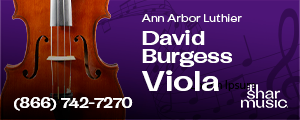We have thousands of human-written stories, discussions, interviews and reviews from today through the past 20+ years. Find them here:

What is a musical instrument?
June 14, 2006 at 5:27 AM
Some of you, my beautiful readers, may remember my blog/bitch session about one of my classes just recently about Electronic music. Well, it appears that this isn't the only thing that I find appalling in Music in Western Australia.The Government of Western Australia is in the process of implementing a new system of education for secondary schools called Outcomes Based Education - known as OBE. This differs from the previous system in that instead of students being awarded Grades (A-F) they are instead awarded a Level. The level is a number of different outcomes that must be achieved in order for that level to be awarded.
Now there's a lot of debate at the moment as to whether this is a good idea or not. I'm not going to get into it, because that's not where my problem lies. My problem lies with the new Music course.
As part of OBE Music, it becomes possible for students to take music and for their instrument to be the Turn-tables, and this is then compared against a number of other more traditional instruments such as the violin and flute etc. The student has to study the same course, and know how to read music, but are the turn-tables really a musical instrument?
Well, by the dictionary definition, yes, and no. A dictionary will tell you that a musical instrument is a device for producing musical sounds. And yea, a turn-table will kind of fit in with that definition. But is it something that is producing musical sounds, or is it reproducing.
See, the problem with turn-tables is that you have to have an LP of pre-recorded material on there. Therefore, by playing it you are reproducing the music that was already recorded by someone else. Sure, the DJ will add scratches or play around with the straight recording, but really it is reproducing the music that has already been produced.
Now some people may argue that that's just what traditional instrumentalists do - we reproduce music that has already been written. Well, yes, in a sense that is right. We do mainly perform works by composers that are a couple of hundred years old. Here's where it gets difficult.
With traditional instruments, a composer will write a piece of music, and they will never really know how it will sound because there are a number of different factors, such as instrument (and the various instruments out there - we all know that most people would choose a Strad over a cheap imitation), skill level of the player, acoustics of the room etc. And again, advocates of the turn-tables have a counter in that there are a number of different factors in producing a good turntables scratch - quality of equipment and speakers for example.
But was the music that they are reproducing originally intended to be reproduced that way? Now this bit I'm not so sure on, and I'm sure that as this style of music grows that people will begin to create music intended to be mixed and scratched over on the turn tables.
So should a Violin be forced to compete with a Turn Table? In my opinion, No. In the previous syllabus, there were two streams - Classical and Jazz. Classical had their requirements, Jazz had theirs. I can't see why there can't be a contemporary syllabus that allows the implementation of Turn Tables, Rock guitar and bass, Pop singing and other such styles of instruments that aren't considered classical. The requirements are different, and as such they aren't require to compete against other styles which can lead to arguments over which style is better, which of course is a useless argument.
Of course, with this course Classical musicians are always at an advantage, often having started from when they were very young and knowing a lot of the music theory stuff that teachers would have to teach these new musicians. I just hope that the classical musicians won't be disregarded in order to bring these newer musicians up to the required level.
Posted on June 14, 2006 at 5:59 AM
Somebody's going to be pissed they were allowed to choose how to scratch a turntable instead of having to choose from violin, sax, and keys.
Posted on June 14, 2006 at 10:09 AM
Posted on June 14, 2006 at 12:42 PM
Posted on June 14, 2006 at 2:11 PM
The question is, is a player piano an instrument? More or less so than a turntable? How about a music box?
A person can develop a skill in producing music with anything, really. We've got a fellow up here called "The Junkman" who makes a living making music on scrap metal, wood, pots and pans, pvc pipes, and anything else he can find.
The difficulty I see in a university setting is in being able to measure and judge the skill required for all these different media.
Posted on June 14, 2006 at 4:59 PM
Yes, I agree with Patty with respect to the "judgement" part. And so, if there is a course on music theory, it better satisfy the needs of the classical people and be judged appropriately; otherwise, you would need a separate "music theory of scratch."
Posted on June 14, 2006 at 7:41 PM
Posted on June 14, 2006 at 7:54 PM
Posted on June 15, 2006 at 2:15 AM
Posted on June 16, 2006 at 3:44 AM
This entry has been archived and is no longer accepting comments.









